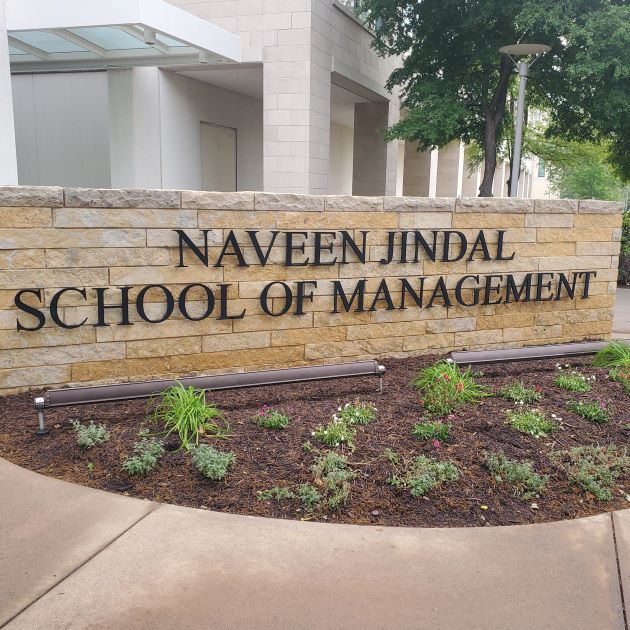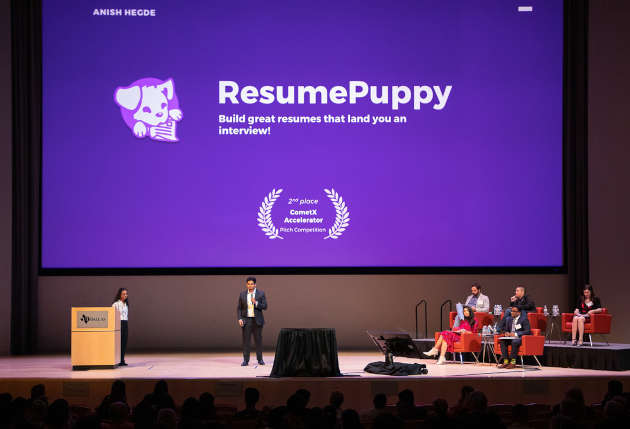
A résumé service that helps job applicants keep ahead of keyword tracking systems captured the judges’ interest and the $25,000 first prize at the 2019 UT Dallas Big Idea Competition. The most high-profile pitch competition of the Institute for Innovation and Entrepreneurship at The University of Texas at Dallas, BIC — as the annual contest is informally known — showcased five other contenders for prize money totaling $40,000.
Those contenders included a STEM-based hands-on project kit, a social network platform to make academic research more accessible, an augmented reality platform to help visualize data and algorithms, an online platform that connects female entrepreneurs with mentors and a dating platform.
The $10,000 second-place winning team, Ohm Maker, was later disqualified. The team also forfeited its $20,000 prize in the UTDesign Startup Challenge. Challenge winners were announced at BIC.
“During a post-event review by committee, it was determined that that team was unable to meet prize qualifications,” said Paul Nichols, executive director of the institute. He also said the second-place prize would remain vacated.
About 900 students, faculty, staff and community members attended the Nov. 19 event at the Edith O’Donnell Arts and Technology Lecture Hall to watch six finalists present their business ideas. They had been selected from more than 200 entrants.
Comedian Michael Shawn, who co-hosts a nationally syndicated radio show, DeDe in the Morning, on K104 (KKDA-FM), was the event’s emcee. Malala Fund and NOW Ventures co-founder Shiza Shahid was the celebrity guest judge. She also gave the event’s keynote presentation at the end of the evening.
“All of you brought so much perspective, and ambition, and passion to the problems that you’re solving,” she said. “That’s what matters because entrepreneurship is not about hitting a home run the first time you try something; it’s about being resilient, it’s about learning how to innovate, how to fail upward. It’s about deciding that you want to do something with your life that is meaningful, that is uniquely yours to do.”
Giving Your Résumé the Right Words
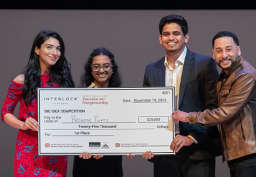
“I realized that there’s something called an applicant-tracking system that picks your résumé based on the keywords that are there in the job description,” he said while delivering his pitch. “So, say your résumé doesn’t have the right keywords. It doesn’t get picked.”
Hegde and his team created a machine-learning and natural-language processing tool to help solve that problem by automatically generating résumés based on essential keywords in the job descriptions.
At the post-competition reception, Hegde said he felt ecstatic about getting validation from the judges, not only about how well he delivered his pitch but also for the product’s value.
The ResumePuppy service “helped a lot of my friends when I released it,” he said. “I realized that this is a problem a lot of people can have. The judges feel that this problem really exists and we can solve it.”
Great Value Propositions — All Around

Chase Murphy, a partner at advisory, tax and assurance firm Baker Tilly, was one of the judges. He said selecting the three prize winners among the six finalists proved to be a difficult task. He had judged other student pitch competitions but found no clear-cut winner in this one.
“All six candidates had a great value proposition,” he said. “It was a struggle to nail it down, for sure.”
Eric Ho, director of strategy initiatives at Capital One, was on the judging panel. He said he wasn’t sure what to expect from a student pitch competition but was impressed by the quality of each of the ideas.
“I was very excited by just looking at all six of the competitors and how far they’ve thought through these concepts — and how far some of them have already taken it,” he said.
The other judges were Dayakar Puskoor, founder and managing partner at Dallas-based venture-capital fund Naya Ventures; Samantha Colletti, senior vice president of Silicon Valley Bank.
The difficulty that the judges experienced in selecting the winners was in indication of the value the institute brings to the students who participate in its programs, said Dresden Goldberg, director of programs and operations for the institute. The institute tries to teach its students an entrepreneurial mindset, she said, a key skill for students to learn.
“Whether they end up working in a corporate office or starting their own business, they need to be creative, be critical thinkers and have problem-solving skills in order to succeed,” she said. “It may be something small like fixing a process that saves time and money or something huge like developing a new product or service that disrupts an entire industry. We just want the students to know they are capable of doing these things, they can drive change, and they can take ownership of a problem and solve it. We are here to support them while they develop those skills.”
Validation — and Funding
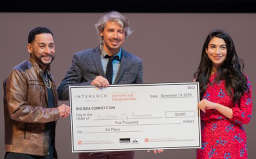
AccessMyResearch, created by cognition and neuroscience PhD student Mehmet Günal, captured the $5,000 third prize for its nonprofit social network platform that makes published academic research papers — and their authors — more accessible to the public.
One unique aspect of AccessMyResearch is that it is the only nonprofit to have made the BIC finals, according to institute administrators. During the reception after the event, Günal noticed how his company fit into the theme of the evening set by Shiza Shahid. Her keynote speech talked about entrepreneurship, he said, “but also how you can be of benefit — to society, to humanity, to civilization — the best way you can while you are also realizing your dreams. I think that’s part of my mission as well in that we are also doing this to benefit society, disseminate knowledge and make research accessible without gaining any monetary profit out of it.”
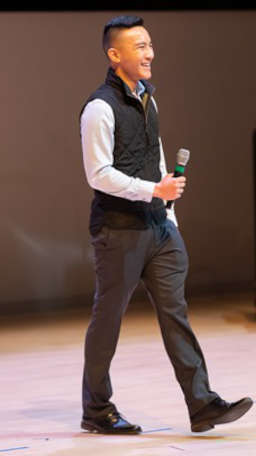
Brian Hoang, BS’18, the first-place winner of the 2018 Big Idea Competition, was on hand to give the audience an update about the 2018 contestants. He announced that SurviVR, the virtual reality law-enforcement training program business he founded and leads, has signed five police departments to its beta test program, received a contract from the U.S. Air Force and has received several hundred thousand dollars in venture funding to date.
The other finalists were:
- CodAR, an augmented-reality visualization platform. Built by computer science graduate students Neha Aggarwal, Siddhartha Sahai and Aditya Singh, the tool helps students and programmers make visual projections of data structures and algorithms.
- Comely, a dating platform created by business administration junior Amelia Novikau.
- IDA, an online platform founded by marketing senior Varika Pinnam that connects female entrepreneurs with mentors
Other Awards
Several special-recognition awards — dubbed Entrepreneurship Awards — were presented at the event. UT Dallas students, alumni, faculty and staff are eligible each year for prizes in several categories.
Leg Up Legal won the $5,000 “Innovate(her)” award. Anjie Vichayanonda, BS’08, founded and heads this web-based mentoring and coaching platform for law students.
Rakkasan Tea Company won the $5,000 “Biggest Social Impact” award for its premium tea that is sources solely from post-conflict countries. The company is headed by co-founder and CEO Brandon Friedman, MPA’06.
In addition to its third-place award, AccessMyResearch won the $5,000 “Biggest Idea” award.
UTDesign Startup Challenge winners included BeYOUty Tech, a company that provides personalized beauty products and services based on environmental conditions, lifestyle habits and other factors. BeYOUty Tech was announced at the event as a $15,000 winner. Upon Ohm Maker’s disqualification, the award was increased to $20,000. Fluid Impulse, a liquid propellant rocket-engine maker, also took home $20,000. The $15,000 prize will remain vacated.


